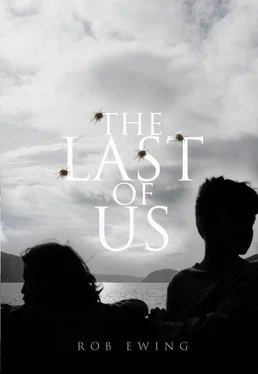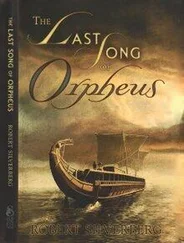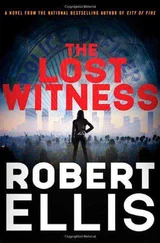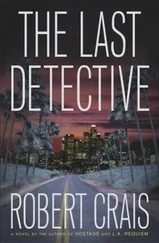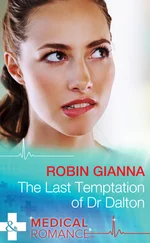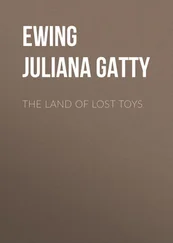Calum Ian was right, though: I did need water. Being thirsty started to take up all my thoughts. Especially as there’d been rain and I never collected any. I knew you couldn’t drink from the sea – that was a rule no one ever attempted to break – but what about rock pools? No one mentioned if rock pools were in or out. Maybe not the ones nearer shore: but what about those higher up?
But it was hard to be certain, so I tore open the cartons of pineapple juice and licked the drops from the bottom of them, then from the shiny insides. The taste only lasted as long as it took to unpick the seams.
I looked for puddles, then for water in the cracks of the wood of the pier. There was a rusty crumpled can, but the water in that had gone gritty, sharp-tasting.
I looked in other places: the drain, the toilet inside, the cars in the car park. I remembered from somewhere that you could suck moss, but where would I find that?
I stared and stared at the sea. At the islands. Until my breath misted the glass of the window. I tried to lick the wetness off, but my tongue was too dry to do it.
Sadness came like a pulse in me. Every few seconds I’d remember, and it would be sharp, and I’d have to turn away from the thought, scrub my mind of it. There would be a second without, before the pulse returned.
I thought for a long time, until it got hard to know if I was thinking or talking.
‘This is me talking now ,’ I said to the world. ‘And now, and now. And now and now. And now.’
It helped to imagine where they were. How tall were the adults? Were teenagers taller? Did the ladies have soft voices? Hopefully they wouldn’t mind that our clothes were dirty, that we had scars on our faces (except Mairi), but anyway, Calum Ian would do a quick job of telling our story. And Alex would be all right once he got his medicine. And Mairi would begin to speak again.
It got to three days: then I had to leave. I packed my teddies and clothes, and took Duncan’s fiddle. Then I used his chalks to write a message on the slipway:
HERE IS RONA
But it didn’t seem clear, so in the end I changed HERE ISto RESCUE. Then after that I used Duncan’s jotters to write a message, which I stuck inside the window of the waiting room. The message was: my name, age, parent, the class I grew up in, the family of children I belonged to.
The road was dotted with grass and sheep shit. There were trees blown into tangles. I didn’t want to look at them, because their shapes made me uneasy.
Every hundred steps I chalked a new arrow to show the way I was going for everyone to see.
It didn’t matter that the arrows wouldn’t last, because they’d be coming soon enough.
Her front door was open. Somebody broke it. There were trails of sheep shit going into the hall, which made me think they should’ve taken better care. Once animals get into your house then it stops being a home.
I thought I saw an old green blanket spread out on the stone steps. It was only when I got up close that I realised: it was the body of a somebody.
Then there was another person: just inside the hall, seen through the broken door. Normal brown hair, but with the face shrunk to a skull. A hand with black fingertips.
I ran away to the far edge of the garden.
Counted twenty.
Watched the bees on the flowers, the seagulls miles away, the slow clouds, to help my eyes forget.
I went around to the back door, and found that they didn’t need to break the front one: the back was open. Or maybe Elizabeth opened it later? But the instant I put my head in there was a smell – a very bad smell.
I didn’t have a perfume-hanky, or goggles, so I decided to run in and out quick, so the stink wouldn’t stay.
The kitchen: a big mess. Cupboards open, drawers crashed to the floor. Plates smashed, tins of food under the table. I had to get out – to breathe.
I went back. Checked under the sink. The water wasn’t where Elizabeth said her mum and dad kept it, so somebody must’ve taken that.
I found one empty bottle, that’s all. I had to get out.
I went back. Found a tin of kidney beans on the floor. Plus a jar of beetroot. And a card on the fridge which said: Jesus loves you – but I’m his favourite.
I tore the card into tiny pieces, not caring that for the time it took I had to take a breath.
Back outside, I drank the juice from the jar of beetroot. The taste was very queer. I opened the can of kidney beans with my opener, but the juice was like glue.
I remembered Elizabeth’s rule for food: smell a lot, taste a little, wait, eat. Only maybe it didn’t matter the same for the water that you got in food?
‘It’s hard without a sidekick,’ I said to the world. ‘It’s not easy to tell yourself you’re thirsty.’
After wrapping a T-shirt and scarf around my nose I went back in. I ran upstairs.
Elizabeth’s bed was made. She had a desk, a CD player. Her pencils stacked neat, in the correct rainbow order, waiting for her to come back and use them.
She kept her achievements on the wall beside her desk. Learn to Swim – Level 5. Beginner’s Gaelic Gold Prize. Well done! You Kept our island Tidy. Summer Star Pupil.RESPECT AWARD PRESENTED TO ELIZABETH SCHOFIELD FOR SHARING HER STORY WITH CLASS P1 READING GROUP.
Just beside, a picture of Elizabeth on the wall. Her skin looked normal: it was from the time before. She looked young. But the main thing was: she smiled. I’d never seen her smile with her eyes taking part.
I took the picture, to show the others when they came back. To show them how strong her smile could be.
So I knew what happened. The people came. ‘They ransacked,’ I said, remembering the exact word.
They were looking for medicines, not food. But Elizabeth’s mum and dad were gone: they were sick at the gym. And anyway, they didn’t have medicine. It was all on the boat, which nobody knew about.
Then I knew why Elizabeth didn’t want to go to her home: because it had been spoiled. We all had clean homes, perfect homes, but she didn’t.
Her home had strangers who had died in it, which was why she never wanted to take us there.
The metal shutters are down at the surgery, even though it’s daytime. There’s a lot of people waiting outside, standing at the front entrance, looking cold and wet.
Mum drives past and parks on the going-down shore road. She checks nobody followed her, then sends a message on her phone, then waits.
In ten minutes someone opens the side door. It’s Morven, who works on reception. She doesn’t say anything or get too close, just shows us in.
As soon as the door’s locked we hear a person running up to it and banging on the other side.
‘Will ye at least look ?’ a man, shouting. ‘I’m not sick, you can look can’t ye? Need our son’s medicine.’
Morven asks the man to be quiet, not to draw attention to himself. Then she goes upstairs ahead of us to ask the doctor what to do.
She comes back – and unlocks the door, lets him in. It’s Mr Gillies who works on the ferry.
When we get to the waiting room Dr Schofield is there. She’s wearing strange clothes: a white paper suit, with blue gloves and covers over her shoes something like the covers they wear at the fish factory.
I see her daughter, Elizabeth, from the big class P7, looking out from one of the nurses’ rooms along the corridor: watching us, her mum.
Mr Gillies looks impatient when he asks the doctor about deliveries and boats and rations. Then he says, ‘Much can I take?’ with a voice that sounds too keen. ‘Away with me, right now? How much?’
Читать дальше
Конец ознакомительного отрывка
Купить книгу
